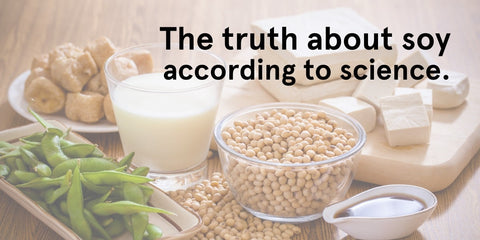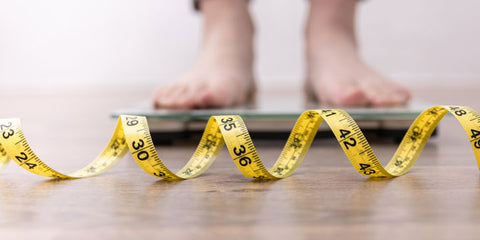If you’ve been in the world of physical fitness or bodybuilding, you may have heard a thing or two about soy. The rumors can make soy look like the enemy to your gains, but maybe it’s time to take a second look at the super plant protein.
Soy often gets a bad rap and has been criticized for having negative effects on men in particular. In reality, the rumors about soy are misleading and simply a case of bad journalism.
Soy protein has been demonized due to its “estrogen-mimicking” compounds and lots of lousy science popularized in the media. For generations, health experts have advised against boys and men consuming soy at all, and with no good reason.
The latest scientific findings don’t support the widespread beliefs about soy. Let’s dive into the accurately reported scientific research and answer the question, “Is soy protein bad for men?”
The Origins of the Soy Estrogen Myth
For some quick background on why ‘experts’ believe that soy is bad for men, you need first to understand soy isoflavones. Isoflavones are plant-derived chemicals (phytochemicals) that fall under “phytoestrogens.” These chemicals are present in all kinds of legumes but most potent in soybeans.
Note the ‘estrogen’ in ‘phytoestrogen’; this terminology is a leading cause of the rumors about soy. Isoflavones function as weak estrogens and, therefore, concern men. Should these estrogen-like chemicals worry men who are seeking to build muscle? Yes and no.

How Does Plant Estrogen Impact Males?
When you double click into the myths surrounding phytoestrogens, you’ll come across reports on estrogen levels, sperm count, changes in appearance, and more, but they’re not always the most accurate.
The truth is that many of the claims surrounding plant proteins and estrogen aren’t proven in research. The small studies that seemed to show that soy reduced sperm count in men were subsequently debunked by several follow-up studies done on a larger scale.
The handful of studies showing any adverse effects of consuming soy have been done using extremely high amounts of soy (over four daily servings), beyond what most people would likely consume. In fact, a recently published analysis looking at 41 clinical trials and testing almost 2,000 men debunked the soy estrogen myth once and for all.
The study found that soy protein had zero impact on testosterone or estrogen levels in men across all trials analyzed. Jim White, RDN, American College of Sports Medicine Exercise Physiologist, commented, “Time and time again, research has shown that soy protein is a great choice for your health and won’t negatively impact your hormone levels. With so much misinformation circulating, it is imperative that we look to credible sources.”
Even popular magazines like Men’s Health, which has been vocally anti-soy in the past, have changed course due to substantial (and mounting) research debunking the idea that soy increases estrogen in males or has any negative impact on male hormones. In fact, back in 2018, they released an article touting the benefits of soy protein for men as an excellent dairy-free alternative and even ranked it higher than almond milk, coconut milk, and rice milk.
Overall, isoflavones are actually very beneficial for human health. They’re a type of antioxidant linked to all sorts of potential benefits like preventing cell oxidation in the body and reducing the occurrence of free radicals that cause cell damage. Many studies have demonstrated that including isoflavone-rich soy foods in a healthy diet could offer protection and support for several systems in the body.

How Much Estrogen is in Soy?
The level to which the soybeans are processed will determine the potency of isoflavones in the soy product you’re eating. For example, minimally processed foods like the whole bean (edamame) and tofu have greater isoflavone content than a more processed protein powder.
Though we’ve already proven that soy protein has zero impact on your hormone levels, it’s important to note that healthy estrogen levels are vital, even for men. Estrogen increases the anabolic response to exercise which may result in an increase in muscle mass.
You should regularly do blood work with your doctor to ensure your diet’s helping you maintain healthy hormone levels.
Soy Protein Holds Up
Now that we know the effects of soy on men’s health and fertility aren’t what most believe them to be, let’s talk about how soy protein holds up against animal protein sources like whey.
A recent study showed that when 16 grams of protein daily were added to the diets of older men and women, participants could maintain or even increase muscle mass, strength, and performance. Whey and soy protein resulted in identical gains, and these gains were seen even in sedentary participants.
Vegan men (and women) looking for a protein source to support their fitness efforts can turn to soy with enthusiasm.
Beyond the isoflavones and high-quality proteins, soy is an excellent source of other beneficial nutrients, including fiber, molybdenum, vitamin K1, folate, copper, manganese, phosphorus, and thiamine. Each of these vitamins and minerals offers its own health benefits and should be part of any balanced diet.

The Effects of Soy That Men Can Count On
It’s important to understand the science behind health claims you may read in a popular magazine or see on your favorite influencer’s YouTuber. While well-meaning, it’s easy to read a single study and then draw an incorrect conclusion.
Well-intentioned misinformation about the hormonal effects of soy on men has persisted for years, but the science doesn’t support the claims.
In truth, soy is an excellent source of protein for everyone, including men. With a wide array of benefits beyond just a high-quality protein source, you can confidently start incorporating more soy into your diet.
Not only is soy an excellent source of protein and fiber, but it also stands up against whey protein in clinical trials when it comes to building and maintaining muscle mass.
Remember, current scientific findings simply do not support the myth about men being negatively affected by the phytoestrogens in soy. There is no evidence to suggest that isoflavones in soy inhibit testosterone or increase estrogen in men, nor is there evidence that soy reduces sperm count or semen parameters in men.
Rest easy, knowing that you can use soy to build and maintain your muscles.






